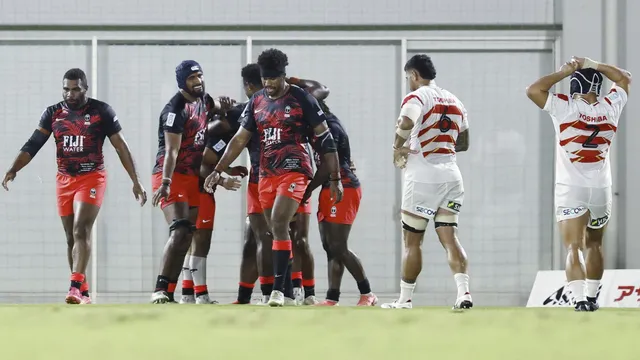
Fiji triumphs over Japan in Pacific Nations Cup final in Osaka
2024-09-21 13:29- Fiji defeated Japan 41-17 in the Pacific Nations Cup final after a 10-10 halftime tie.
- The match featured five tries from Fiji, with standout performances from players like Caleb Muntz and Ponepati Loganimasi.
- This victory marked Fiji's sixth title in the Pacific Nations Cup, reinforcing their dominance in the tournament.
Express your sentiment!
Insights
In the Pacific Nations Cup final held at Hanazono Stadium in Osaka, Fiji triumphed over Japan with a score of 41-17 after a tightly contested first half that ended in a 10-10 tie. The match showcased Fiji's physicality and speed, which ultimately wore down the Japanese team. Fiji's coach, Mick Byrne, emphasized the importance of maintaining pressure during the first half to set the stage for their second-half performance. Japan initially took the lead with a brilliant solo try from center Dylan Riley, but Fiji responded with a try from Vuate Karawalevu, capitalizing on a fortunate bounce. The second half saw Fiji take control, especially after Japan's hooker Mamoru Harada was sin-binned, giving Fiji a man advantage. Despite a disallowed try for Fiji's standout flyhalf Caleb Muntz, he contributed significantly with a penalty that put Fiji ahead. Fiji's dominance continued as they scored multiple tries, including contributions from debutant Ponepati Loganimasi and replacement forward Albert Tuisue. Muntz, who was named player of the tournament, successfully converted all six of his attempts, showcasing Fiji's offensive prowess. Japan managed to score a consolation try late in the game, but it was not enough to change the outcome. This victory marked Fiji's sixth title in the Pacific Nations Cup, extending their record and highlighting their strength in the tournament. The win also underscored Japan's struggles against Fiji, as they have now lost six of their last seven encounters with them.
Contexts
Fiji triumphed over Japan in the Pacific Nations Cup final held in Osaka, showcasing their strong rugby performance. This victory comes at a time when international sporting events are gaining attention, reflecting the growing competitiveness in the rugby arena. In the broader context, President Biden is currently hosting a summit with leaders from Australia, India, and Japan, emphasizing international collaboration. This summit may have implications for U.S. foreign relations, particularly in the Asia-Pacific region, where sports and diplomacy often intersect. Additionally, the recent backlash faced by Indy Clinton and her husband during their flight from Fiji to Australia highlights the challenges of public perception and behavior in travel, which can resonate with the experiences of athletes and teams traveling for competitions. Overall, Fiji's victory in the Pacific Nations Cup final not only marks a significant achievement in sports but also occurs amidst a backdrop of international engagement and discussions that may influence future sporting and diplomatic relations in the region.